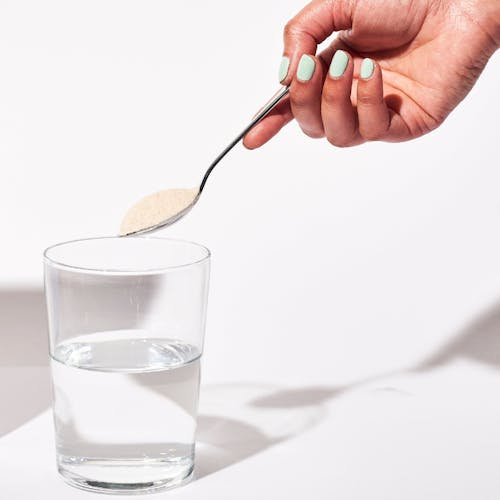This website uses cookies to enhance the user experience. By using Yoppie you are agreeing to our use of cookies.
10 daily habits for PCOS
Written by Megan Hallett
24 Aug 2022
1). Start the day with a protein-packed breakfast
2). Opt for three balanced meals over grazing throughout the day
3). Sip on apple cider vinegar before meals
4). Take a 15-minute walk after your meals
5). Add a couple of sessions of resistance training into your week
6). Start swapping your refined grains for fibre-rich, slow-releasing carbohydrates
7). Rethink your supplement routine
8). Include a variety of antioxidant-rich plants
9). Include the foods you love
10). Get off your phone before bed
10 Daily Habits For PCOS
1). Start the day with a protein-packed breakfast
What you have for breakfast can really set the tone for the rest of the day. Traditional breakfast foods such as cereal or muesli, toast and jam and even your bowl of oats can create a blood sugar spike first thing. After drastic spikes, come drastic drops and you are on your way to a blood sugar rollercoaster. Unstable blood sugar directly impacts your insulin levels, which in turn impacts your PCOS symptoms. You may also experience fatigue, cravings or shifts in mood.
Your goal for breakfast should be to start the day off on a blood sugar neutral - done by including protein (aim for 30g!), fat and fibre. By doing this alone, you’re less likely to crash around lunchtime and feel the need to pull yourself off the floor with something super sweet. By stabilising blood sugar, you’re on the right path to managing insulin levels and mastering your PCOS symptoms.
Some of my favourite breakfasts include:
- A high protein smoothie
- Eggs and avocado
- Coconut yoghurt alongside eggs or full-fat, organic Greek yoghurt
2). Opt for three balanced meals over grazing throughout the day
As with breakfast, we want your meals to contain protein, fibre and fat, in order of priority. You can then add that complex carbohydrate source in at the end, but avoid carbohydrates on their own. The more fibre a carbohydrate has, the better. I typically recommend adding a non-starchy source of fibre on top of your carbs, as this really keeps that blood sugar curve neutral.
3). Sip on apple cider vinegar before meals
Vinegar is well researched for its blood sugar regulating benefits, making it a great PCOS staple for your fridge. Add a table spoon to a glass of water then sip on before your meals to help flatten the curve and thus, impacting your sex and stress hormone balance.
You can add a dash of cinnamon for taste and additional blood sugar stabilising benefits.
4). Take a 15-minute walk after your meals
Walking is one of the most underrated forms of exercise. Not only is it low intensity, reducing impact on your stress hormones, it also helps to optimise your circadian rhythm. One of the biggest selling points for incorporating more walking into your day, is that by opting for a brisk 15-minute stroll after your meals you are essentially making room for the glucose from the meal in your muscles, impacting the blood sugar curve and therefore the spike it may have on insulin release.
5). Add a couple of sessions of resistance training into your week
There is a lot of confusion around exercise and PCOS, and what is the best form of exercise. The short answer is that if something leaves you exhausted or drives symptoms, it probably isn’t for you. However, adding in 2-3 sessions of low intensity resistance training into your week is another way to increase the body’s sensitivity to insulin. As 70% of women with PCOS have the insulin resistant type, including daily habits that supports metabolic health and makes the body more sensitive to insulin is key.
6). Start swapping your refined grains for fibre-rich, slow-releasing carbohydrates
PCOS bodies are a little bit more sensitive to carbohydrates than those that don’t have PCOS, but that doesn’t mean we want to banish them completely. The quality of your carbohydrates is key and can have a big impact on that blood sugar curve throughout the day.
Ideally, the majority of your carbohydrates are whole and fibrous. This means that the grain hasn’t been milled down into a flour and then rebuilt, as ultimately this is where we see quite large blood sugar spikes (remember, lots of blood sugar spikes = high insulin = high testosterone = symptoms). Carbohydrates that are in their whole, natural form and contain lots of lovely fibre, such as legumes, whole grains and starchy veg, take longer to break down into glucose, creating a smaller blood sugar spike.
Absolutely still eat your pasta and bread if you tolerate them, as we really want to avoid feelings of restriction, but really think about :
1) Day to day, swapping them for higher fibre, more complex alternatives (such as seedy, whole grain bread or red lentil pasta)
2) Always add a source of protein and fat to help stabilise the curve.
7). Rethink your supplement routine
We can end up relying quite heavily on supplements and forget about the power of good nutrition and lifestyle changes. Supplements should be there to fill in the gaps and supplement an already solid, healthy lifestyle.
Instead of buying every type of herb or nutrient on the market, really think about stripping it back to basics and starting from there. Give each addition enough time to work before placing it in the supplement graveyard and moving onto the next. This is where working with a professional can be helpful. We can take a look at you and the drivers of your PCOS, functional testing, alongside any gaps in diet and your lifestyle, to see what you actually need.
A few of the basics for PCOS include inositol, B vitamins, magnesium and omega 3, with potential around zinc, vitamin D and targeted herbs and botanicals depending on the person.
8). Include a variety of antioxidant-rich plants
Variety is key when it comes to nurturing your gut. Inflammation can stem from the gut, and as PCOS can be rooted in inflammation, thinking about your gut health each day is key. The antioxidants found in colourful plants, such as berries, cacao, greens, fresh herbs and green tea are wonderful for feeding the bugs in your gut, modulating immune function and supporting inflammatory symptoms such as acne or joint pain.
What’s more, we have a type of bacteria in our gut called akkermansia which plays a role in glucose metabolism. I’ve seen many cases where akkermansia is low or undetectable on a stool test in those with PCOS. As we’ve discussed, it is vital that we manage glucose metabolism in order to reduce PCOS symptoms. Feeding and caring for akkermansia levels is another way of doing so. Think aronia berry powder, flaxseed and purple fruits and veg. This type of bacteria also protects the gut lining from damage or inflammation.
9). Include the foods you love
Women with PCOS are more likely to experience disordered eating patterns, so including foods you love that might not be the most nutritious option is really important in avoiding restrictive mindsets. I see a lot of clients who have been “good” for so long that are exhausted and result in bingeing on “bad” foods and feel stuck in that cycle. Remove the labels from your food and really focus on including an abundance of food that makes your body feel great.
If you find yourself obsessing over your food choices, please speak with someone! Our relationship with food is a huge piece of the wellbeing puzzle.
10). Get off your phone before bed
The blue light from our screens has been shown to lower melatonin production. Melatonin is our sleepy hormone, as well as having strong antioxidant properties. We want melatonin to be too strong at night to aid restful, high quality sleep. Sleep impacts our ability to regulate our blood sugar throughout the day and module immune function (think inflammation!), making sleep a fundamental part of reducing your PCOS symptoms.
Put your phone down and out of sight, ideally an hour before bed. Read instead and burn some soothing essential oils to aid a peaceful slumber.
Megan Hallett (@meganhallettnutrition) is a women's health nutritionist, nutritional therapist and cookbook author specialising in hormonal imbalance and women's health conditions including PCOS, endometriosis, hypothalamic amenorrhea. and fertility.
Want to learn more about your hormone health? You can now book a session with Megan here
Got a question about PCOS? Get in touch with us directly on Instagram at @itsyoppie or email hello@yoppie.com. Don't forget our menstrual care subscription can be a good place to start for supplements for your PMS, PCOS or Endometriosis as you can get them delivered easily & regularly through your letterbox.
Section jump
Back to top
Subscribe To Our Newsletter
YOPPIE





© 2026 Yoppie is a registered trademark of Phlo Technologies Ltd.
Yoppie's supplements are not a substitute for a varied diet and healthy lifestyle and are not intended to diagnose, treat, or cure any disease. If you are pregnant, breastfeeding, have a medical condition or are under medical supervision, please consult with your doctor before taking any of our products.







